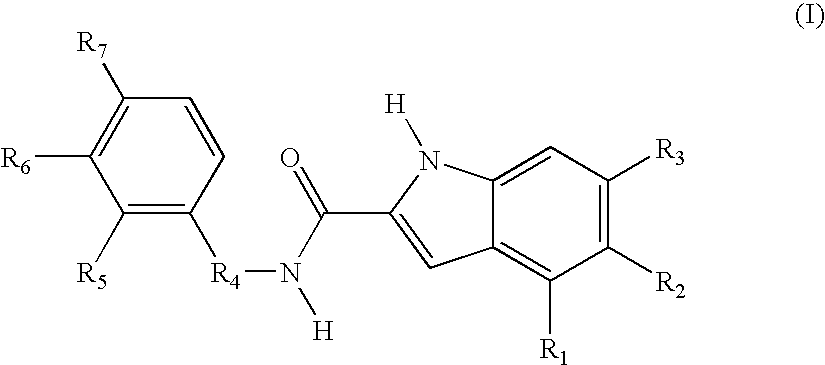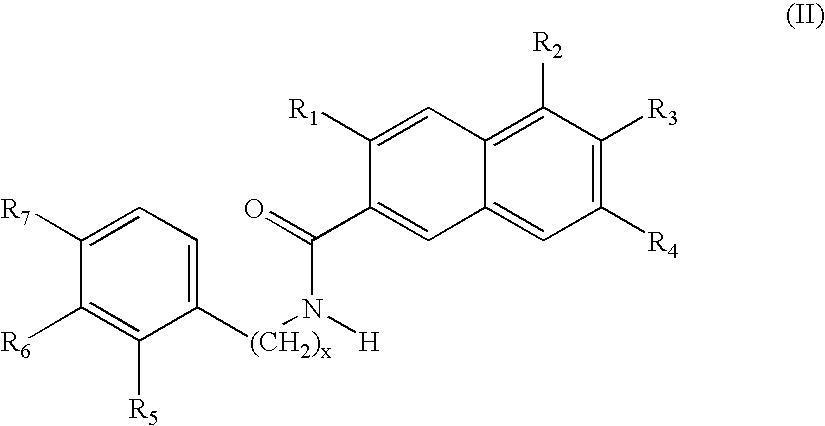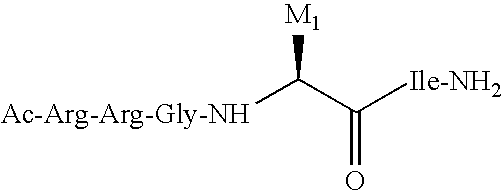Kinase inhibitors
- Summary
- Abstract
- Description
- Claims
- Application Information
AI Technical Summary
Benefits of technology
Problems solved by technology
Method used
Image
Examples
example 1
Design, Synthesis and Activity of Non-ATP Competitive Hydroxynaphthalene Derivative Inhibitors of pp60c-Src Tyrosine Kinase
[0104] The crystal structure of the autoinhibited human IRTK catalytic domain (Hubbard et al., 1994) was used to carry out qualitative molecular modeling studies (SYBYL™, 6.4, Tripos Inc., St. Louis) wherein a naphthalene ring was superimposed upon the IRTK Tyr 1,162. The IRTK region containing Tyr 1,162 folds back into the active site, with Tyr 1,162 positioned analogous to a phosphorylated Tyr in a peptide substrate, thereby autoinhibiting the tyrosine kinase. This superimposition indicated that an amide carbonyl should be placed at the 2-position (Scheme 1) of the
naphthalene ring to mimic the Tyr 1,162 carbonyl and a hydroxyl group should be positioned at the 6-position to mimic the Tyr 1,162 hydroxyl group. These modeling studies also indicated that a hydroxyl group at the 3-position could mimic the Tyr 1,162 NH.
[0105] In order to test these design conc...
example 2
Design, Synthesis and Activity of Non-ATP Competitive Hydroxyindole Derivative Inhibitors of pp60c-Src Tyrosine Kinase
[0116] In the preceding example, the structure-based design of a series of pp60c-src inhibitors utilizing a naphthalene scaffold is described. These compounds were designed to bind in the peptide substrate site because of the potential for greater selectivity and efficacy in a cellular environment relative to the alternative ATP
substrate site. This example presents an extension of these design concepts to a series of pp60c-src inhibitors based upon an indole scaffold. Once again the crystal structure of the autoinhibited insulin receptor PTK (IRTK) was used to carry out qualitative molecular modeling studies, except in this case an indole ring was superimposed upon the IRTK Tyr 1,162. This superimposition indicated that the indole NH can mimic the Tyr 1,162 NH, a carbonyl should be placed at the 2-position, and a hydroxyl group should be placed at the 5 position ...
example 3
Synthesis of Indole Derivative Protein Kinase Inhibitors
[0133] The following results show the synthesis and testing of indole derived protein kinase inhibitors. Four reaction schemes are provided and separately followed by experimental details for the preparation of the final product of each of these reaction schemes. These final products are examples of indole-base tyrosine kinase inhibitors wherein the synthesis with certain groups on the aryl ring of the indole moiety is illustrated (boronic acid, Scheme 1; OH, Scheme 2; an aliphatic amide extension, Scheme 3; and a phosphonic acid Scheme 4).
Methyl 5-hydroxy-2-indolecarboxylate (1)
[0134] Dissolved 3.50 g 5-hydroxy-2-indolecarboxylic acid in anh. MeOH pre-saturated with HCl gas. Refluxed for 48 hours. Concentrated in vacuo and triturated with AcCN×3 to remove residual acid. Filtered through silica plug with EtOAc to remove baseline contamination. Recovered 4.32 g (quant. yield) TLC Rf=0.78 (EtOAc) 1H NMR (DMSO-d6): 3.82 (s, 3H...
PUM
| Property | Measurement | Unit |
|---|---|---|
| Time | aaaaa | aaaaa |
| Time | aaaaa | aaaaa |
| Mass | aaaaa | aaaaa |
Abstract
Description
Claims
Application Information
 Login to View More
Login to View More - R&D
- Intellectual Property
- Life Sciences
- Materials
- Tech Scout
- Unparalleled Data Quality
- Higher Quality Content
- 60% Fewer Hallucinations
Browse by: Latest US Patents, China's latest patents, Technical Efficacy Thesaurus, Application Domain, Technology Topic, Popular Technical Reports.
© 2025 PatSnap. All rights reserved.Legal|Privacy policy|Modern Slavery Act Transparency Statement|Sitemap|About US| Contact US: help@patsnap.com



